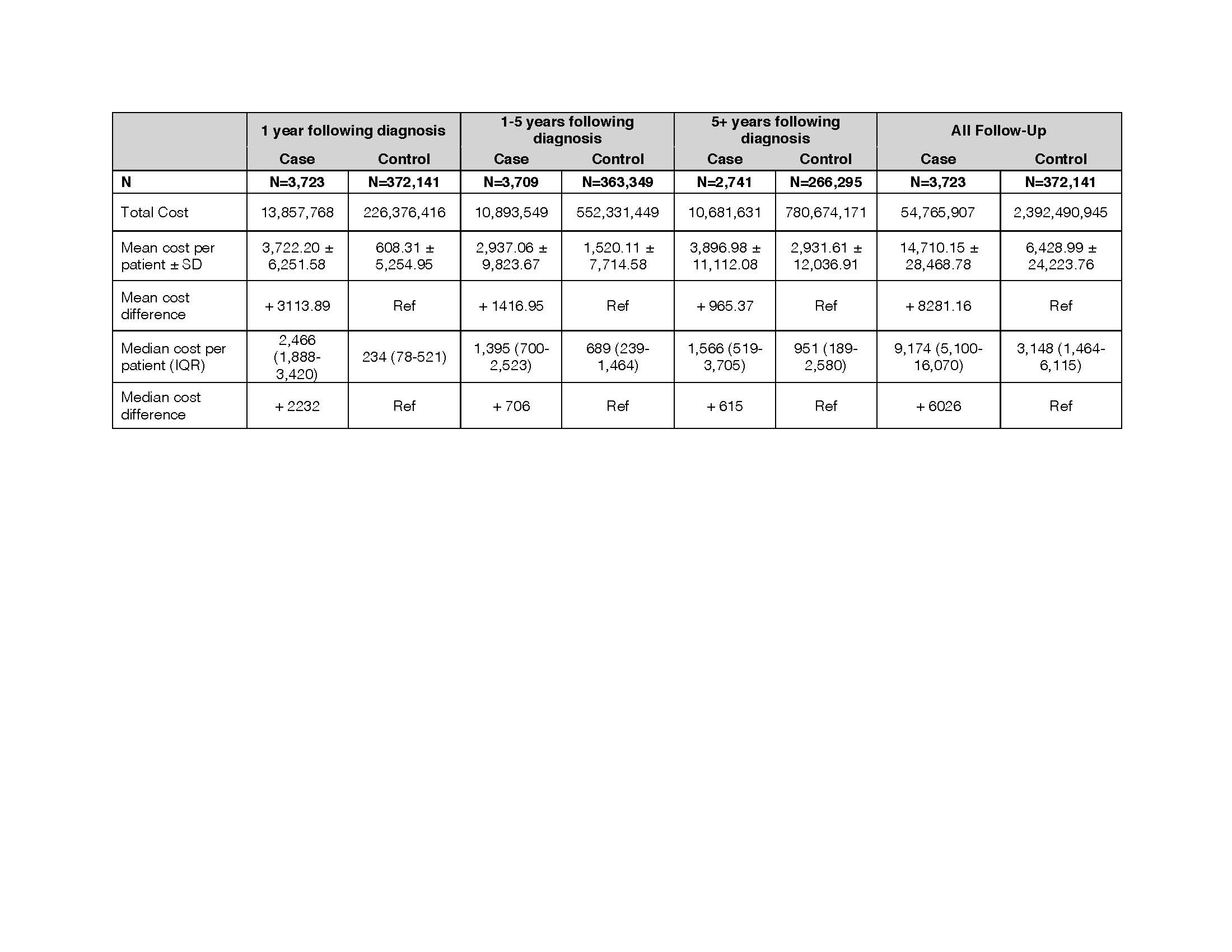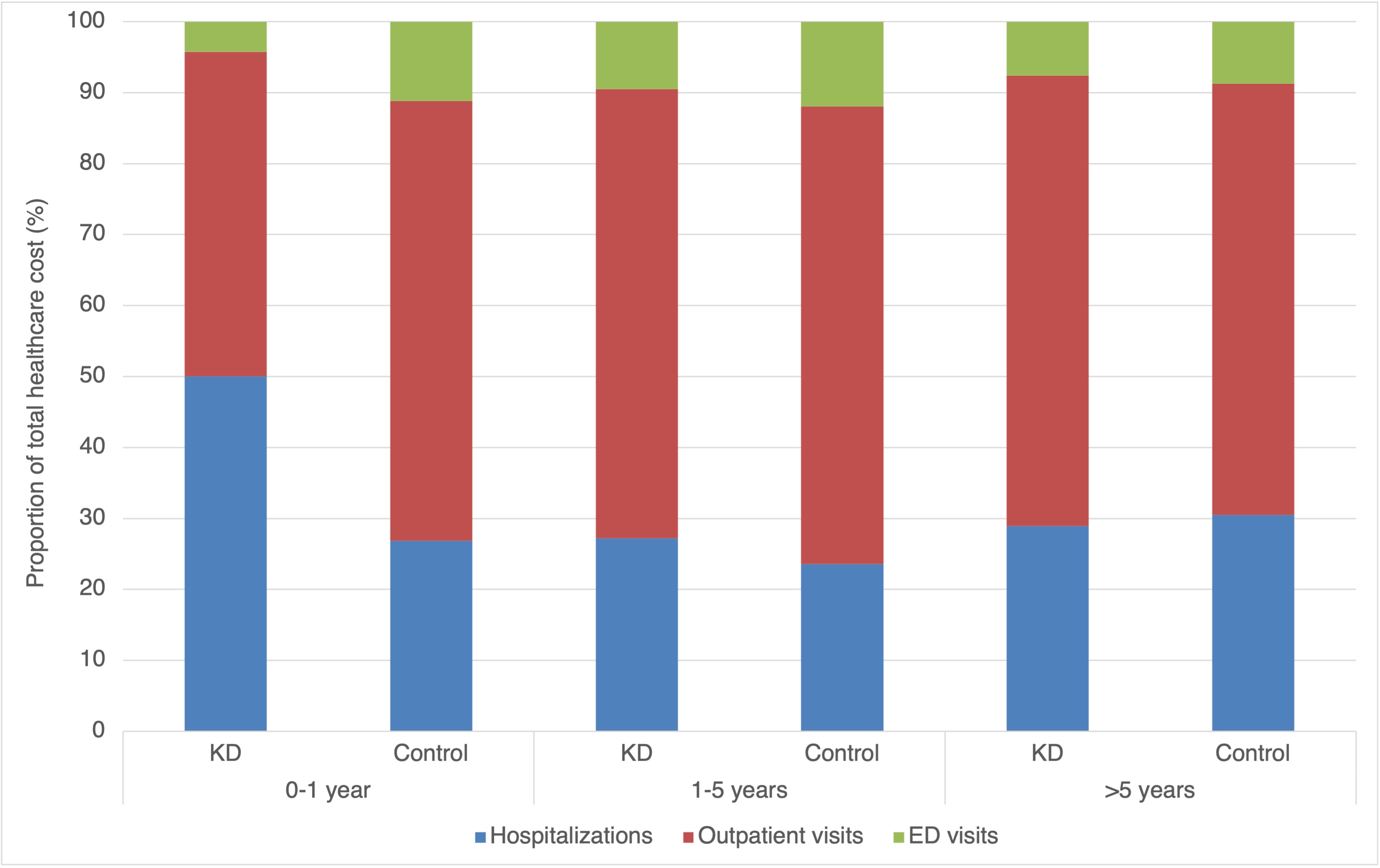Session Information
Date: Saturday, November 6, 2021
Title: Health Services Research Poster I: Lupus, Inflammatory Arthritis, & More (0128–0148)
Session Type: Poster Session A
Session Time: 8:30AM-10:30AM
Background/Purpose: The incidence of Kawasaki Disease (KD) has increased by nearly 50% in Ontario, Canada over the past two decades. Little is known about the long-term burden of illness and healthcare utilization among KD survivors, particularly in a universal healthcare system. The aim of our study was to describe patterns of healthcare utilization and associated costs among KD survivors vs. matched controls in Ontario, Canada.
Methods: We used population-based health administrative databases to identify all children (0-18yr) hospitalized for KD in Ontario between 1995-2018. We excluded non-Ontario residents. Each case was matched to 100 non-exposed comparators by age, sex, and index year and follow-up continued until death or March 2019. Our primary outcomes were hospitalization, emergency department and outpatient visits. We evaluated healthcare costs (in Canadian Dollars [CAD], adjusted for inflation to the 2018 year) associated with each event type, as well as composite healthcare costs, including hospitalizations, ED visits and outpatient costs (i.e., lab services, physician billings and capitation payments).
Results: We compared 4,597 KD survivors to 459,700 matched comparators. Median follow-up duration was 11.1 years (IQR 5.5-17.0) for KD cases and 10.0 years (IQR 4.5-16.0) for non-exposed children. KD survivors had higher rates of hospitalization (adjusted rate ratio 2.07, 95%CI 2.00-2.15), outpatient visits (1.30, 95%CI 1.28-1.33) and ED visits (1.22, 95%CI 1.18-1.26) throughout follow-up (Table 1). Within 1yr post-discharge, 717 (15.6%) of KD cases were re-hospitalized, 4587 (99.8%) had ≥1 outpatient physician visit and 1695 (45.5%) had ≥1 ED visit. KD survivors had higher composite healthcare costs throughout follow-up (median $9,174 vs. $3,148 CAD) (Table 2). Total healthcare costs for KD cases in Ontario were $13.9 million (within one year post-discharge) and $54.8 million (throughout follow-up). Outpatient care was the largest cost driver for both KD (50% of total healthcare costs) and non-exposed cohorts (55%) (Figure 1). However, the proportion of costs attributable to hospitalizations was higher among KD cases (43% vs. 36% non-exposed), due to higher hospitalization costs within the first year post-discharge.
Conclusion: Compared to non-exposed children, KD survivors had significantly higher long-term rates of healthcare utilization and cost. Nearly all KD cases were seen by a pediatrician or primary care physician within one year post-discharge, while less than half were seen by a cardiologist. The rising incidence and attributable costs associated with KD place a significant burden on Ontario’s healthcare system.
To cite this abstract in AMA style:
Robinson C, Chanchlani R, Gayowsky A, Darling E, Seow H, Batthish M. Healthcare Utilization and Costs Following Kawasaki Disease in Ontario, Canada [abstract]. Arthritis Rheumatol. 2021; 73 (suppl 9). https://acrabstracts.org/abstract/healthcare-utilization-and-costs-following-kawasaki-disease-in-ontario-canada/. Accessed .« Back to ACR Convergence 2021
ACR Meeting Abstracts - https://acrabstracts.org/abstract/healthcare-utilization-and-costs-following-kawasaki-disease-in-ontario-canada/



